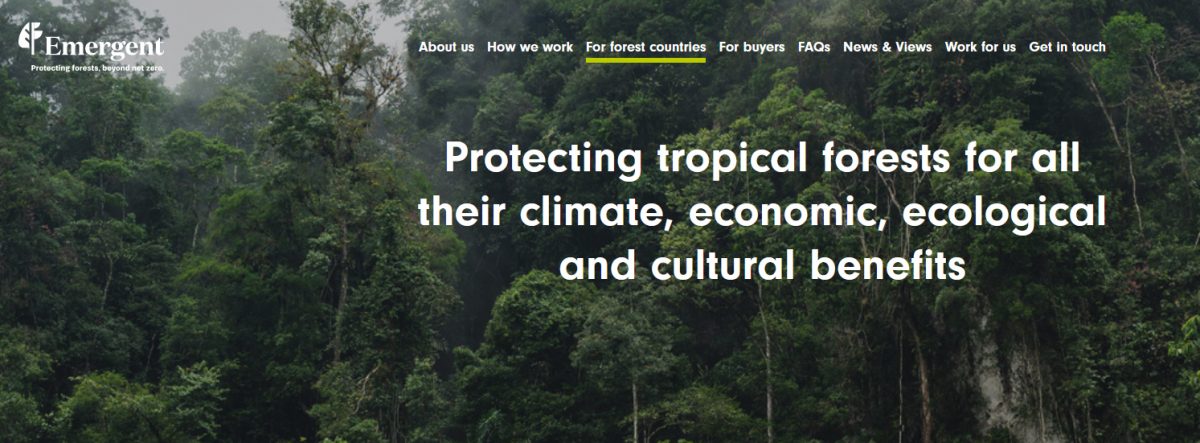President Irfaan Ali yesterday announced that the government has signed a letter of intent with a United States- based non-profit organisation to market Guyana’s carbon credits which will be sold to private companies around the world.
“To advance our participation in the carbon market, we have signed a letter of intent with Emergent, a US- based non-profit organisation, to sell our carbon credits through credit contract. This Agreement has the potential of earning us hundreds of millions of US dollars annually,” Ali disclosed at a press conference held at State House yesterday.
There had been no prior announcement of this letter of intent and it raises questions about the process that the government embarked upon to select the company. The country’s carbon credits would have to be considered a national resource, deployment of which would have to be discussed with stakeholders and then tendered. For decades the carbon credit market has seen major volatility and previous attempts by Guyana to enter trading have not materialized. The credits would be essentially purchased to help companies offset their carbon emissions.
While the organisation has on its website a presentation made by Guyana’s Vice President, Bharrat Jagdeo at a virtual meeting held recently, there has been no discussion of the matter here.
Attempts to contact Jagdeo yesterday for clarification were futile as several calls and messages to his mobile number went unanswered.
Based on information available on Emergent’s website, it is “a non-profit intermediary engaging between tropical forest countries and the private sector to mobilize finance to support emissions reductions in deforestation.”
Emergent said that it carries out its mandate by “developing and bringing-to-market practical, credible and large scale forest protection solutions.”
Its mission, it stated, is to accelerate the speed and scale of tropical forest protection so as to combat the climate crisis and plans to end deforestation. This will be done given the growing private sector demand for carbon credits, thus providing long-term funding for forest nations to protect their irreplaceable natural assets.
The organisation is a participant in the recently launched Lowering Emis-sions by Accelerating Forest (LEAF) finance coalition or project, which is a voluntary global initiative aimed at bringing together companies and governments to provide finance for tropical and subtropical forest conservation commensurate with the scale of the climate change challenge.
The coalition was launched at the Leaders’ Summit on Climate by a group of government and private companies on April 22 of this year.
A press release issued by Emergent revealed that it will serve as the administrator of LEAF and will offer support including intermediary services for transactions, as applicable, and provide post-transaction infrastructure for partners that choose to transact through it.
Following its launching, LEAF issued a Call for Proposals (CFP) to provide substantial financial support to tropical and subtropical countries that successfully reduce emissions from deforestation and forest degradation. The initial CFP is expected to help catalyse significant reductions of greenhouse gas (GHG) emissions through a combination of forward purchase agreements and floor price commitments at US$10 per tonne for at least 100 million metric tonnes of CO2. It is expected that this will contribute to the rapidly expanding market for high quality carbon credits from jurisdictional REDD+ (Reducing Emissions from Deforestation and forest Degradation) programmes.
Private sector buyers
“We then sell these credits to private sector buyers who seek to meet their climate mitigation and emissions reductions goals. This speeds-up, simplifies & standardizes the credit-buying process for both forest nation sellers and private sector buyers – which, in turn, stimulates supply as demand emerges. By bringing together donor funds to provide floor price guarantees to jurisdictional sellers, we enable them to make the necessary investments in reducing deforestation. We also ensure proceeds from transactions are reinvested according to robust financial, social, and environmental safeguards. Our business model catalyses the carbon market so that we can protect forests at pace,” the Company stated.
During the launching, Jagdeo, who had orchestrated the last Norway forest protection pact that also earned funds, was this country’s representative.
According to the organisation’s website, the vice-president said that he welcomed the launch of the LEAF, noting that tropical forest countries have long called for the ecosystem services provided by the world’s standing tropical forests to be properly valued, through both public and private finance. “This will enable people who live in forests and forest countries to create jobs and economic opportunity from an economy that works with nature, instead of today’s reality where forests are often worth more dead than alive. If this new economy is to be more attractive than the old economy, LEAF must also catalyse funds that flow quickly and efficiently. The systems to enable this can only be successful if forest countries are involved in their design – and we stand ready to work with the LEAF Coalition to achieve the innovation required,” an excerpt from his presentation quoted by EMERGENT states.
While Emergent has been designed to facilitate transactions like those under the LEAF initiative by acting as a cost-efficient intermediary; whereby it is able to act as counterparty to suppliers, sovereign contributors, and private sector buyers, they will also offer a platform to suppliers of carbon credits recognising that suppliers may consider selling subsequent and/or additional credits to buyers beyond the coalition.
While Ali said that Guyana has an agreement signed with Emergent, is unclear if Guyana has taken advantage of selling beyond LEAF.
Proposals for the LEAF initiative can only be submitted after May 3.
However, according to Emergent, it anticipates that its first credits will be available in 2022, initially offering several millions tonnes with volumes building from there and that suppliers will be selected based on the same criteria outlined by LEAF Coalition.






